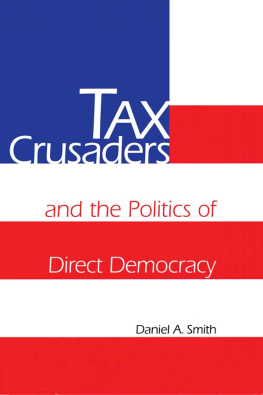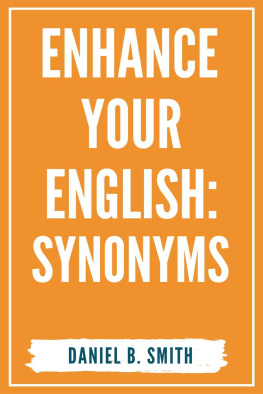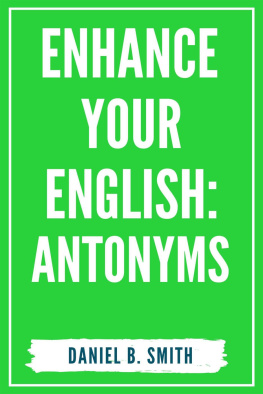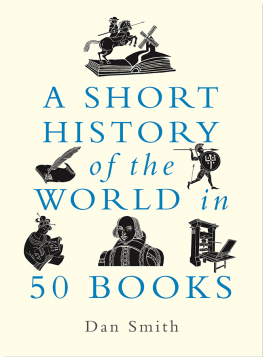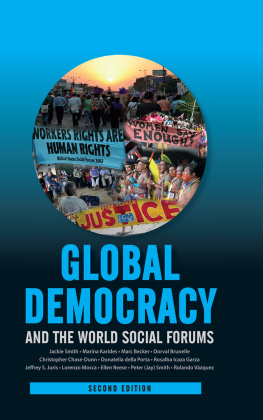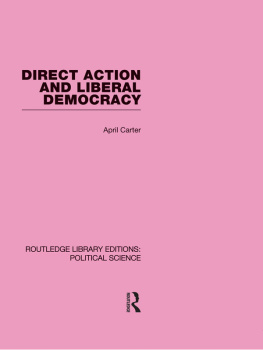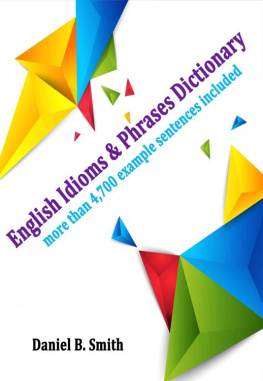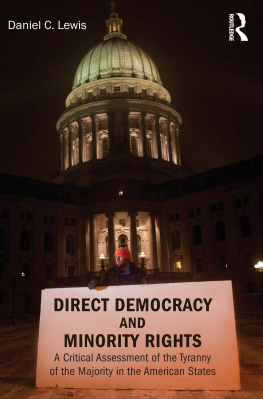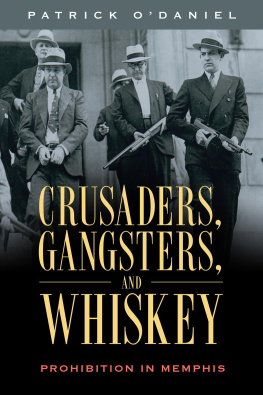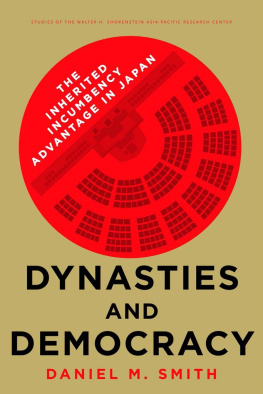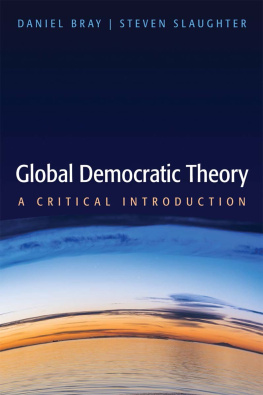Tax Crusaders
and the Politics of Direct Democracy
TAX CRUSADERS
and the Politics of
Direct Democracy
Daniel A. Smith
This edition published 2011 by Routledge:
Routledge
Taylor & Francis Group
711 Third Avenue
New York, NY 10017 | Routledge
Taylor & Francis Group
2 Park Square, Milton Park
Abingdon, Oxon OX14 4RN |
Published in 1998 by
Routledge
29 West 35th Street
New York, NY 10001
Published in Great Britain by
Routledge
11 New Fetter Lane
London EC4P 4EE
Copyright 1998 by Routledge
All rights reserved. No part of this book maybe reprinted or reproduced or utilized in any form or by any electronic, mechanical or other means, now known or hereafter invented, including photocopying and recording, or in any information storage or retrieval system, without permission in writing from the publisher.
Library of Congress Cataloging-in-Publication Data
Smith, Daniel A.
Tax crusaders and the politics of direct democracy / Daniel A. Smith
p. cm.
Includes bibliographical references.
ISBN 0-415-91991-6
1. Tax and expenditure limitationsUnited StatesStates
2. ReferendumUnited StatesStates I. Title.
HJ4182.S65 1998
| 336.2050973dc21 | 97-51490 |
| CIP |
In loving memory of Catherine "Kit" Graf Fernald, an inspiring grassroots activist
CONTENTS
In the course of this study I have incurred numerous debts to my family, friends, and colleagues. My editor at Routledge, Melissa Rosati, had faith in my ability to write an academic book that would be of general interest. Her sharp observations and persistent enthusiasm were immense sources of motivation. Thanks also to Janelle Miau, Paul Mooney, Lai Moy, and Eric Nelson for shepherding the book through its many production stages. You all helped to make my job much easier.
My biggest debt is to the many people who shared with me their knowledge about tax limitation ballot measures. I received an invaluable education talking directly with several tax crusaders, their collaborators, and their opponents. In particular, Barbara Anderson, Douglas Bruce, Chip Faulkner, David Biddulph, Joel Fox, Richard Manley, Greg Walerius, and John Flannigan generously shared their knowledge about the politics and process of direct democracy.
A mini-sabbatical from the Division of Arts, Humanities, and Social Sciences and two grants from the Faculty Research Fund at the University of Denver enabled me to carry out my archival research and personal interviews in California, Colorado, and Massachusetts. The editors of Great Plains Research kindly granted permission to reproduce parts of my article on Douglas Bruce. Director Nelson Polsby and the staff at the Institute of Governmental Studies at the University of California, Berkeley were extremely generous with their time and expertise, as were the many research librarians and staff at the California State Archives, the California State Library (where the Howard Jarvis and Paul Gann papers are housed), the California Secretary of State, the Massachusetts State Archives, the Massachusetts Secretary of State, the Colorado Legislative Council, and the Colorado Secretary of State. I am indebted to Nate Golich, my undergraduate work study for three years, who provided me with outstanding research assistance along the way.
A number of friends and colleagues read or discussed with me various parts of the manuscript. Paula Baker, Richard Braunstein, Robin Calland, Anne Campbell, Tom Cronin, Chuck Epp, Kevin Glynn, Rodney Hero, Robert Herrington, Allen Hertzke, Lora Jost, Dave Magleby, Paul Passavant, Grant Reeher, Caroline Tolbert, and Greg White all provided me with critical feedback. Numerous colleagues at the University of Denver helped me clarify my ideas and made me look beyond my own presumptions. A decade ago, Peter Eisinger, my dissertation advisor at the University of Wisconsin-Madison, introduced me to the rich complexities of state politics and political economy, and has been continually supportive of my research efforts. Thanks to my in-laws, Robert and Leita Chalfin, for their support, and especially to my parents for all their guidance over the years. My mother, Susan Fernald Smith, copy-edited the entire manuscript, and my father, Ronald A. Smith, a historian by training, did his best to keep his snide (but usually apropos) comments concerning political science's jargon to a minimum.
Above all, for her critical insights and enduring support, my warmest thanks go to my wife and best friend, Brenda Chalfin.
Anti-tax ballot initiatives have become an important part of the political landscape in nearly half of the American states. Many scholars, journalists, and of course the tax limitation proponents and their supporters, generally view these ballot measures as products of broad-based, grassroots movements. Backers of these measures, like tax crusader David Biddulph of the Tax Cap Committee in Florida, contend that their citizen initiatives, will once and for all put the power back in the hands of the people where the power should be. In the abstract, many scholars too find wonderment in the initiative process. They note how tax limitation initiatives tend to spring from the only legitimate fountain of authority the people. It is the citizens, after all, and not their unresponsive elected officials or the special interests, who place initiatives on state ballots. According to the conventional wisdom, which is an amalgam of these and other perspectives, tax limitation measures are generally understood as being the product of grassroots citizen groups that are able to mobilize fellow citizens in support of their cause.
This book challenges the conventional wisdom. This is not an easy task, as the making and reinforcement of this standard view has gone relatively unchallenged for more than twenty years. With the passage of Proposition
Expression of this populist, not to mention popular, viewpoint resounds in the explosive rhetoric of prominent tax crusaders like Jarvis, as well as in the echoes of their zealous and vocal supporters. Equally pervasive, though perhaps somewhat more subdued, this populist perspective informs much of the academic research and journalistic accounts on tax limitation measures. This conventional wisdom the broadly accepted interpretation of the nature of tax limitation initiatives that a majority of scholars and journalists subscribe to has gone undisputed because scholars and journalists tend to make two basic assumptions about the initiative process. First, they tend to pit direct democracy and representative democracy against one another as binary opposites. Second, they tend to equate the widespread support at the polls on election day for tax limitation measures with extensive grassroots, citizen participation during the foregoing initiative campaign. These two assumptions, because they have gone relatively unquestioned over the years, have impeded more thorough investigations of tax limitation citizen initiatives. Instead of contesting the conventional wisdom, journalists and scholars have tended to reproduce the portraiture of the anti-tax movement as painted by tax crusaders and their supporters, and in turn, have only reinforced the general public's view of tax limitation initiatives.


